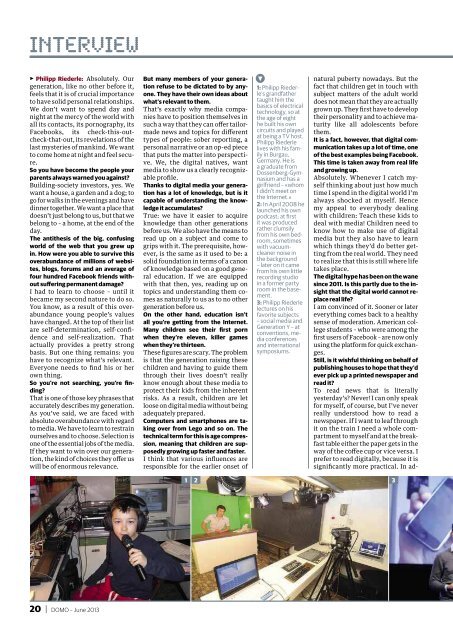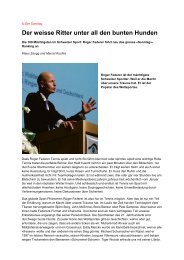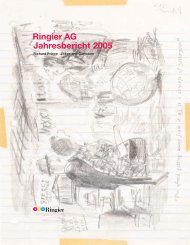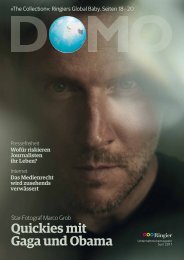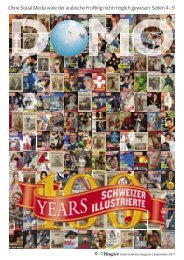DOMO June 2013 pdf - Ringier
DOMO June 2013 pdf - Ringier
DOMO June 2013 pdf - Ringier
You also want an ePaper? Increase the reach of your titles
YUMPU automatically turns print PDFs into web optimized ePapers that Google loves.
•<br />
interview<br />
a Philipp Riederle: Absolutely. Our<br />
generation, like no other before it,<br />
feels that it is of crucial importance<br />
to have solid personal relationships.<br />
We don’t want to spend day and<br />
night at the mercy of the world with<br />
all its contacts, its pornography, its<br />
Facebooks, its check-this-outcheck-that-out,<br />
its revelations of the<br />
last mysteries of mankind. We want<br />
to come home at night and feel secure.<br />
So you have become the people your<br />
parents always warned you against?<br />
Building-society investors, yes. We<br />
want a house, a garden and a dog; to<br />
go for walks in the evenings and have<br />
dinner together. We want a place that<br />
doesn’t just belong to us, but that we<br />
belong to – a home, at the end of the<br />
day.<br />
The antithesis of the big, confusing<br />
world of the web that you grew up<br />
in. How were you able to survive this<br />
overabundance of millions of websites,<br />
blogs, forums and an average of<br />
four hundred Facebook friends without<br />
suffering permanent damage?<br />
I had to learn to choose – until it<br />
became my second nature to do so.<br />
You know, as a result of this overabundance<br />
young people’s values<br />
have changed. At the top of their list<br />
are self-determination, self-confidence<br />
and self-realization. That<br />
actually provides a pretty strong<br />
basis. But one thing remains: you<br />
have to recognize what’s relevant.<br />
Everyone needs to find his or her<br />
own thing.<br />
So you’re not searching, you′re finding?<br />
That is one of those key phrases that<br />
accurately describes my generation.<br />
As you’ve said, we are faced with<br />
absolute overabundance with regard<br />
to media. We have to learn to restrain<br />
ourselves and to choose. Selection is<br />
one of the essential jobs of the media.<br />
If they want to win over our generation,<br />
the kind of choices they offer us<br />
will be of enormous relevance.<br />
But many members of your generation<br />
refuse to be dictated to by anyone.<br />
They have their own ideas about<br />
what’s relevant to them.<br />
That’s exactly why media companies<br />
have to position themselves in<br />
such a way that they can offer tailormade<br />
news and topics for different<br />
types of people: sober reporting, a<br />
personal narrative or an op-ed piece<br />
that puts the matter into perspective.<br />
We, the digital natives, want<br />
media to show us a clearly recognizable<br />
profile.<br />
Thanks to digital media your generation<br />
has a lot of knowledge, but is it<br />
capable of understanding the knowledge<br />
it accumulates?<br />
True: we have it easier to acquire<br />
knowledge than other generations<br />
before us. We also have the means to<br />
read up on a subject and come to<br />
grips with it. The prerequisite, however,<br />
is the same as it used to be: a<br />
solid foundation in terms of a canon<br />
of knowledge based on a good general<br />
education. If we are equipped<br />
with that then, yes, reading up on<br />
topics and understanding them comes<br />
as naturally to us as to no other<br />
generation before us.<br />
On the other hand, education isn′t<br />
all you′re getting from the Internet.<br />
Many children see their first porn<br />
when they’re eleven, killer games<br />
when they’re thirteen.<br />
These figures are scary. The problem<br />
is that the generation raising these<br />
children and having to guide them<br />
through their lives doesn’t really<br />
know enough about these media to<br />
protect their kids from the inherent<br />
risks. As a result, children are let<br />
loose on digital media without being<br />
adequately prepared.<br />
Computers and smartphones are taking<br />
over from Lego and so on. The<br />
technical term for this is age compression,<br />
meaning that children are supposedly<br />
growing up faster and faster.<br />
I think that various influences are<br />
responsible for the earlier onset of<br />
•<br />
1: Philipp Riederle‘s<br />
grandfather<br />
taught him the<br />
basics of electrical<br />
technology, so at<br />
the age of eight<br />
he built his own<br />
circuits and played<br />
at being a TV host.<br />
Philipp Riederle<br />
lives with his family<br />
in Burgau,<br />
Germany. He is<br />
a graduate from<br />
Dossenberg-Gymnasium<br />
and has a<br />
girlfriend – «whom<br />
I didn’t meet on<br />
the Internet.»<br />
2: In April 2008 he<br />
launched his own<br />
podcast; at first<br />
it was produced<br />
rather clumsily<br />
from his own bedroom,<br />
sometimes<br />
with vacuumcleaner<br />
noise in<br />
the background<br />
– later on it came<br />
from his own little<br />
recording studio<br />
in a former party<br />
room in the basement.<br />
3: Philipp Riederle<br />
lectures on his<br />
favorite subjects<br />
– social media and<br />
Generation Y – at<br />
conventions, media<br />
conferences<br />
and international<br />
symposiums.<br />
natural puberty nowadays. But the<br />
fact that children get in touch with<br />
subject matters of the adult world<br />
does not mean that they are actually<br />
grown up. They first have to develop<br />
their personality and to achieve maturity<br />
like all adolescents before<br />
them.<br />
It is a fact, however, that digital communication<br />
takes up a lot of time, one<br />
of the best examples being Facebook.<br />
This time is taken away from real life<br />
and growing up.<br />
Absolutely. Whenever I catch myself<br />
thinking about just how much<br />
time I spend in the digital world I’m<br />
always shocked at myself. Hence<br />
my appeal to everybody dealing<br />
with children: Teach these kids to<br />
deal with media! Children need to<br />
know how to make use of digital<br />
media but they also have to learn<br />
which things they’d do better getting<br />
from the real world. They need<br />
to realize that this is still where life<br />
takes place.<br />
The digital hype has been on the wane<br />
since 2011. Is this partly due to the insight<br />
that the digital world cannot replace<br />
real life?<br />
I am convinced of it. Sooner or later<br />
everything comes back to a healthy<br />
sense of moderation. American college<br />
students – who were among the<br />
first users of Facebook – are now only<br />
using the platform for quick exchanges.<br />
Still, is it wishful thinking on behalf of<br />
publishing houses to hope that they′d<br />
ever pick up a printed newspaper and<br />
read it?<br />
To read news that is literally<br />
yesterday’s? Never! I can only speak<br />
for myself, of course, but I’ve never<br />
really understood how to read a<br />
newspaper. If I want to leaf through<br />
it on the train I need a whole compartment<br />
to myself and at the breakfast<br />
table either the paper gets in the<br />
way of the coffee cup or vice versa. I<br />
prefer to read digitally, because it is<br />
significantly more practical. In ad-<br />
1 2 3<br />
dition, I need to be able to mark a<br />
text passage or save it in order to use<br />
it again later; or to look for catchwords,<br />
links to an article and maybe<br />
look at the comments on it. All of<br />
which speaks in favor of digital reading.<br />
What kind of online offerings are you<br />
prepared to pay for?<br />
The weekly newspaper «Die Zeit»<br />
offers a brilliant digital edition. As a<br />
weekly it deals with issues in a more<br />
in-depth way and from a distance<br />
that is only possible in hindsight – as<br />
opposed to the daily newspapers. I<br />
think their long feature articles are<br />
great. They provide me with intense<br />
insight into a topic. The audio pieces<br />
are just fantastic. Each issue offers<br />
me up to twenty professionally recorded<br />
audio files. Whether I’m on the<br />
bus, on the train or jogging I can listen<br />
to the Zeit’s most important articles<br />
on my iPhone. This service really<br />
sets them apart from the huge<br />
grey majority.<br />
Please give me an overview of what<br />
you read during the course of a day.<br />
I read up on the latest news of the<br />
day on the big online portals of<br />
Spiegel and Süddeutsche Zeitung; I<br />
have a digital subscription to Die<br />
Zeit and Der Spiegel even though<br />
you only get a student’s discount for<br />
the print editions. In addition, I<br />
regularly check up things in the<br />
Newsreader. Of course I keep an eye<br />
on Twitter and Facebook. I am also<br />
interested in the local section of our<br />
regional newspaper, which I read<br />
online.<br />
Is there no glossy magazine that you<br />
enjoy so much that you′d like to hold<br />
it in your hands?<br />
I like «Cicero» as well as «brand eins».<br />
Of course it is much easier to quickly<br />
buy such a magazine at the train<br />
station’s newsstand instead of having<br />
to download the issue via the<br />
slow Internet connection on your cell<br />
phone. But it isn’t practical. It’s annoying<br />
having to carry an extra ten<br />
In his book «Wer<br />
wir sind und was<br />
wir wollen» (Who<br />
we are and what<br />
we want) Philipp<br />
Riederle gives an<br />
account of the<br />
point of view of<br />
today’s web-savvy<br />
youth. Without<br />
needing to log<br />
in or submit a<br />
password his readers<br />
learn what the<br />
business of ideas<br />
might look like in<br />
the future. «By the<br />
way, while I was<br />
working on this<br />
book I once again<br />
came to feel that<br />
this is a medium I<br />
can appreciate.»<br />
Or, to put it differently:<br />
«like».<br />
pounds of print products along with<br />
my usual luggage.<br />
What do you call «glossy» among online<br />
publications?<br />
When apps don’t merely provide a<br />
digital equivalent of the print edition<br />
but give me added value. What also<br />
matters are the little details that<br />
make reading easy: special options<br />
for saving and highlighting. Also, the<br />
articles need to be optimized for each<br />
type of reading device, and I think it’s<br />
important for them to have a way to<br />
archive articles. Videos and audio<br />
files are great.<br />
Let′s get back again to the little house<br />
with a garden. According to researchers<br />
and youth studies the house<br />
with a garden matters to young people<br />
because they want to preserve the<br />
wealth of their parents in this uncertain<br />
world.<br />
It’s pretty much along those lines. We<br />
are looking for a foundation; we want<br />
to put down roots. These are our basic<br />
human values and needs. That’s<br />
the reason why magazines like<br />
«Landlust» - in Switzerland it’s called<br />
«LandLiebe» - are so successful. Regional<br />
crime series on TV are booming,<br />
too. Our place in the world is<br />
not an e-mail address or a Facebook<br />
account. It’s a little house with a picket<br />
fence. <br />
20 | <strong>DOMO</strong> – <strong>June</strong> <strong>2013</strong> <strong>DOMO</strong> – <strong>June</strong> <strong>2013</strong> | 21


